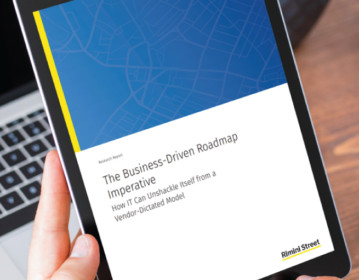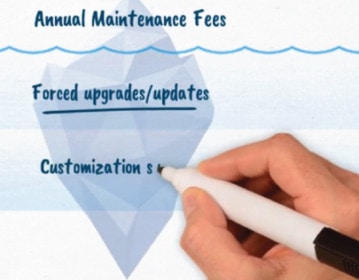ERP and database vendors don’t want you to know who we are, or that we’ve saved our clients nearly $5B to date on support fees. Rimini Street is a global partner organizations can trust to help cut costs to drive innovation and growth. Other companies do software. We do support.
Additional Resources

We don't make ERP or database software like Oracle and SAP. We support and manage that software. Over the past 15 years, we have helped over 3,000 clients save billions of dollars. It's because we are built for support. Built to help clients avoid costly fees and ERP upgrades, so they can innovate and fuel growth. Other companies do software. We do support.

Adoption of third-party support for enterprise software is now mainstream. In a report sponsored by Rimini Street, industry research firm Valoir analyzed the growing acceptance of third-party support, finding that demand is widespread — from cost-cutters to innovators to a variety of companies in-between. Valoir found that in some instances, even ERP vendors reluctantly acknowledge the utility of third-party support as they focus efforts on the cloud. Third-party support has evolved into a strategic portfolio management tool for enterprise applications, gaining broader strategic acceptance from its origins as a cost containment tactic. Valoir found that its versatility facilitates: Innovation around the edges of a mature, highly functional ERP system Maximizing value from existing investments Taking a measured approach to cloud evolution Digital transformation Tactically, independent, third-party software support helps CIOs save resources and keep IT teams engaged with new initiatives rather than routine support. Strategically, it helps CIOs meet business objectives, demonstrate value, and move to a Business-Driven Roadmap from one dictated by an ERP vendor. In its report, Valoir specifically recognized Rimini Street for its: Breadth of knowledge and depth of support, featuring a dedicated engineer model Pure focus on independent, third-party support versus other IT or consulting services Track record of strong client relationships Value, service, price

Although many CIOs have the mandate to innovate, only a lucky few get new budget and staff to deliver the innovation. Those that don’t must balance the challenge of resource allocation with the pressure of adhering to costly ERP vendor roadmaps—for maintenance or cloud migration—or seemingly risk losing vendor support. Making the mindset shift from a vendor-driven model to a Business-Driven Roadmap—where IT spending is aligned with business goals, priorities, and timing—can enable you to: optimize budget and staff to create capacity: allocate the right organizational resources to the right pursuits to support targeted business outcomes accelerate innovation: use created capacity to adopt new best-in-class IT functionalities to enable business strategy future-proof your enterprise: maximize the value and lifespan of existing and customized assets to serve business goals Discover the 11 attributes of a Business-Driven Roadmap and how it can enable you to maintain control of your company’s IT direction.

While most IT and Finance teams know they spend a large percentage of the IT budget on annual software maintenance, many are unaware of the total operational costs of their ERP systems. This quick video uses a simple iceberg methodology to show how you can calculate annualized upgrade costs, as well as the fully-burdened spend tied to self-support and custom code support. Then see how third-party support dramatically changes the equation below the waterline.

Global steel manufacturer, Tempel Steel, moves to Rimini Street for support of Oracle E-Business Suite and Oracle Databases, receiving improved service levels and gaining access to funds and resources for targeted investments into strategic initiatives that drive value for the organization, including purchasing additional Oracle modules to fuel business growth.
